CTV NEWSCHANNEL: BILLY EICHNER ON PLAYING TIMON IN “THE LION KING.”
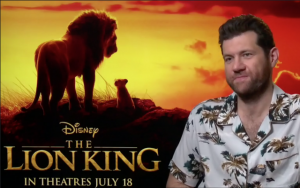 “The Lion King” star Billy Eichner speaks with Richard about playing Timon in the photo-realistic remake and working with Seth Rogen.
“The Lion King” star Billy Eichner speaks with Richard about playing Timon in the photo-realistic remake and working with Seth Rogen.
Watch the whole thing HERE!
 “The Lion King” star Billy Eichner speaks with Richard about playing Timon in the photo-realistic remake and working with Seth Rogen.
“The Lion King” star Billy Eichner speaks with Richard about playing Timon in the photo-realistic remake and working with Seth Rogen.
Watch the whole thing HERE!
 Richard fills in for Barb DiGiulio on NewTalk 1010’s The Nightside. Here Richard talks to Billy Eichner, co-star of the new, photo-realistic remake of “The Lion King.”
Richard fills in for Barb DiGiulio on NewTalk 1010’s The Nightside. Here Richard talks to Billy Eichner, co-star of the new, photo-realistic remake of “The Lion King.”
Listen to the whole thing HERE!
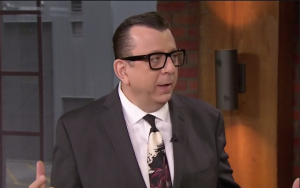 Richard joins CP24 to have a look at the weekend’s new movies including “The Lion King,” “The Farewell,” the documentary “Propaganda: The Art of Selling Lies” and the Jessie Eisenberg satire “The Art of Self-Defense.”
Richard joins CP24 to have a look at the weekend’s new movies including “The Lion King,” “The Farewell,” the documentary “Propaganda: The Art of Selling Lies” and the Jessie Eisenberg satire “The Art of Self-Defense.”
Watch the whole thing HERE!
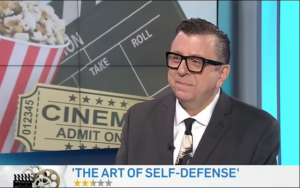 Richard sits in on the CTV NewsChannel with news anchor Marcia MacMillan to have a look at the weekend’s big releases including all-singing, all-animal “The Lion King,” the poignant family dramedy “The Farewell,” the timely documentary “Propaganda: The Art of Selling Lies” and the dark Jessie Eisenberg satire “The Art of Self-Defense” with CFRA Morning Rush guest host Matt Harris.
Richard sits in on the CTV NewsChannel with news anchor Marcia MacMillan to have a look at the weekend’s big releases including all-singing, all-animal “The Lion King,” the poignant family dramedy “The Farewell,” the timely documentary “Propaganda: The Art of Selling Lies” and the dark Jessie Eisenberg satire “The Art of Self-Defense” with CFRA Morning Rush guest host Matt Harris.
Watch the whole thing HERE!
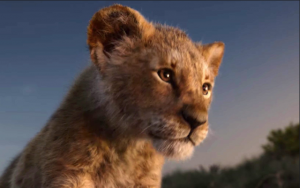 Richard has a look at the new movies coming to theatres, including the photo realistic “The Lion King,” the poignant family drama “The Farewell,” the timely documentary “Propaganda: The Art of Selling Lies” and the dark Jessie Eisenberg satire “The Art of Self-Defense” with CFRA Morning Rush guest host Matt Harris.
Richard has a look at the new movies coming to theatres, including the photo realistic “The Lion King,” the poignant family drama “The Farewell,” the timely documentary “Propaganda: The Art of Selling Lies” and the dark Jessie Eisenberg satire “The Art of Self-Defense” with CFRA Morning Rush guest host Matt Harris.
Listen to the whole thing HERE!
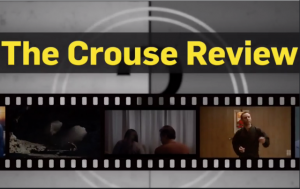 A weekly feature from ctvnews.ca! The Crouse Review is a quick, hot take on the weekend’s biggest and most interesting movies! This week Richard looks at the photo realistic “The Lion King”–“You will believe a meerkat can sing! And lions too!”–the poignant family drama “The Farewell” and the dark Jessie Eisenberg satire “The Art of Self-Defense.”
A weekly feature from ctvnews.ca! The Crouse Review is a quick, hot take on the weekend’s biggest and most interesting movies! This week Richard looks at the photo realistic “The Lion King”–“You will believe a meerkat can sing! And lions too!”–the poignant family drama “The Farewell” and the dark Jessie Eisenberg satire “The Art of Self-Defense.”
Watch the whole thing HERE!
 Richard joins the number one news broadcast in the country, the CTV National News, to talk about the continued popularity of “The Lion King.”
Richard joins the number one news broadcast in the country, the CTV National News, to talk about the continued popularity of “The Lion King.”
Watch the whole report HERE!
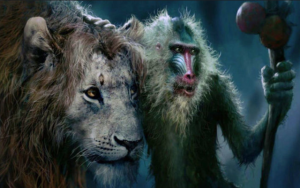 A fitting tag line for the new, photo-realistic “The Lion King” would be something along the lines of, “You will believe a meerkat can sing! And lions too!” The good folks at Disney and director Jon Favreau have created computer-generated animals that chatter and sing like high-tech Mr. Eds but does it improve on the original or is it a deepfake copycat of the 1994 classic?
A fitting tag line for the new, photo-realistic “The Lion King” would be something along the lines of, “You will believe a meerkat can sing! And lions too!” The good folks at Disney and director Jon Favreau have created computer-generated animals that chatter and sing like high-tech Mr. Eds but does it improve on the original or is it a deepfake copycat of the 1994 classic?
Beat for beat the story is familiar. We see young Simba, the lion prince voiced by JD McCrary as a cub, then by Donald Glover as a full-grown king of the jungle, presented to his tribe by proud parents Mufasa (James Earl Jones) and Sarabi (Alfre Woodard). One day the Pride Lands, everything the sun touches, will be his (“It belongs to no one,” intones Mufasa, “but it will be yours to protect.”) unless his evil uncle Scar (Chiwetel Ejiofor), who feels he is the rightful heir, has his way. After an attempt or two to jump the succession queue Scar succeeds, manufacturing the ultimate betrayal of his brother and nephew. Simba, riddled with guilt, wrongly thinking he caused the death of his father, goes into exile. “The king is dead,” Scar hisses, “and if it weren’t for you he’d still be alive. A boy who killed a king. Run-away Simba and never return.”
The young cub finds his way into the arms of a brave warthog Pumbaa and wise-cracking meerkat Timon (voiced by Seth Rogen and Billy Eichner). They teach him the philosophy of “Hakuna Matata”—essentially, “Turn the ‘WHAT!’ into ‘So what.’”—and how to survive without eating them or any of their friends. When Simba’s childhood girlfriend Nala (Beyoncé Knowles-Carter) brings stories of how Scar and his hyena henchmen are destroying the Pride Lands with over hunting and cruelty, Simba returns to reclaim his rightful birthright.
The photo-realistic look of “The Lion King” resembles one of those Disney nature documentaries. The visuals, made up of bits and bytes, are remarkable in their life-like appearance but ultimately feels like a triumph of technology over emotional storytelling. The Shakespearean narrative arc of the story still reverberates with echoes of “Hamlet” but with the realism comes less nuance in expression. Simba and Nala look like lions who have learned to speak but the character work, a raised eyebrow or a scrunched face, the things that make characters really come alive, is missing. They sing and dance but their faces are weirdly without the joy that should come along with their actions. Favreau takes pains not to anthropomorphize the animals any more than necessary but in staying faithful to the innate inspirations for the characters he misses something crucial, the human element that connects with the audience.
The intense scenes, particularly the death of the patriarch, may be too intense for younger viewers. The animated version was one thing but the hyper-realistic version of events is horrific the first time we see it and even more-so in flashback.
The voice work mostly works. It’s a pleasure to hear James Earl Jones’s dulcet tones and the inclusion of African actors like John Kani, who plays the mystical mandrill Rafiki, is a very comfortable fit in the film’s soundscape. Rogen and Eichner provide some much-needed comic relief and enliven any scene they’re in.
The songs will be familiar to “Lion King” fans, although they appear in altered form. “Hakuna Matata” and “I Just Can’t Wait to Be King” brim with fun but two of the original film’s best-known songs—Scar’s “Be Prepared” and “Can You Feel the Love Tonight”—have been reworked. Scar’s song is underplayed while “Can You Feel the Love Tonight” is, for no good reason, set during daylight hours.
“The Lion King” is a stunning technical achievement, but feels like a risk-free exercise in nostalgia that will entertain your eye but likely won’t engage your heart.
 Richard sits in on the CJAD Montreal morning show with host Andrew Carter to talk the new movies coming to theatres including “The Lion King”–“You will believe a meerkat can sing! And lions too!”–and the dark Jessie Eisenberg satire “The Art of Self-Defense.”
Richard sits in on the CJAD Montreal morning show with host Andrew Carter to talk the new movies coming to theatres including “The Lion King”–“You will believe a meerkat can sing! And lions too!”–and the dark Jessie Eisenberg satire “The Art of Self-Defense.”
Listen to the whole thing HERE!